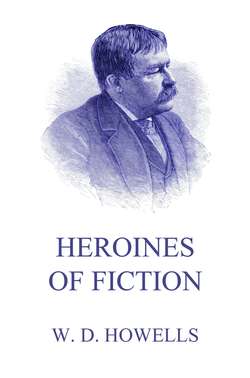Читать книгу Heroines Of Fiction - William Dean Howells - Страница 23
На сайте Литреса книга снята с продажи.
II
ОглавлениеThis outline of the story gives no just sense of its quality, which resides mainly in its constancy to nature; and it gives no sufficient notion of the variety of character involved in the uneventful, quiet action. Anne's arrogant and selfish father, her cold-hearted, selfish elder sister, and her mean, silly, empty-headed younger sister, with the simple, kindly Musgrove family, form rather the witnesses than the persons of the drama, which transacts itself with the connivance rather than the participation of Sir Walter's heir-at-law, the clever, depraved and unscrupulous cousin, William Walter Eliot; Lady Russell, the ill-advised adviser of the broken engagement; the low-born, maneuvering Mrs. Clay, who all but captures the unwary Sir Walter; the frank, warm-hearted Admiral Crofts and his wife, and the whole sympathetic naval contingent at Lyme Regis. They brighten the reality of the picture, and form its atmosphere; they could not be spared, and yet, with the exception of Louisa Musgrove, who jumps from the sea-wall at Regis, and by her happy accident brings about the final understanding of the lovers, none of them actively contributes to the event, which for the most part accomplishes itself subjectively through the nature of Anne and Wentworth.
Of the two Anne is by far the more interesting and important personage; her story is distinctly the story of a heroine; yet never was there a heroine so little self- assertive, so far from forth-putting. When the book opens, we find her neglected and contemned by her father and elder sister, and sunken passively if not willingly into mere aunthood to her younger sister's children, with no friend who feels her value but that Lady Russell who has helped her to spoil her life. She goes to pay a long visit to her sister as soon as Kellynch Hall is taken by the Croftses, and it is in a characteristic moment of her usefulness there that Wentworth happens upon her, after their first cold and distant meeting before others.
The mother, as usual, had left a sick child to Anne's care, when "Captain Wentworth walked into the drawing-room at the Cottage, where were only herself and the little invalid Charles, who was lying on the sofa. . . . He started, and could only say, ' I thought the Miss Musgroves had been here; Mrs. Musgrove told me I should find them here,' before he walked to the window to recollect himself, and feel how he ought to behave. 'They are up-stairs with my sister; they will be down in a few minutes, I dare say,' had been Anne's reply in all the confusion that was natural; and if the child had not called to her to come and do something for him, she would have been out of the room the next moment, and released Captain Wentworth as well as herself. He continued at the window, and after calmly and politely saying,' I hope the little boy is better,' was silent. She was obliged to kneel by the sofa, and remain there to satisfy her patient, and thus they continued a few minutes, when, to her very great satisfaction, she heard some other person crossing the vestibule. It proved to be Charles Hayter," who supposes Wentworth to be his rival for one of the Miss Musgroves. He seats himself, and takes up a newspaper, ignoring Wentworth's willingness to talk. " Another minute brought another addition. The younger boy, a remarkably stout, forward child of two years old, having got the door opened, made his determined appearance among them, and went straight to the sofa to see what was going on, and put in his claim to anything good that might be given away. There being nothing to eat, he could only have some play, and as his aunt would not let him tease his sick brother, he began to fasten himself upon her, as she knelt, in a way that, busy as she was about Charles, she could not shake him off. She spoke to him, ordered, insisted, and entreated in vain. Once she did contrive to push him away, but the boy had the greater pleasure in getting upon her back again directly. 'Walter', said she, 'get down this moment. You are extremely troublesome. I am very angry with you.' 'Walter,' cried Charles Hayter, ' why do you not do as you are bid? . . . Come to me, Walter.' But not a bit did Walter stir. In another moment she found herself in the state of being released from him; someone was taking him from her, though he had bent down her head so much that his sturdy little hands were unfastened from around her neck and he was resolutely borne away, before she knew that Captain Wentworth had done it. . . . She could not even thank him. She could only hang over little Charles with most disordered feelings . . . with the conviction soon forced upon her by the noise he was studiously making with the child, that he meant to avoid hearing her thanks . . . till enabled by the entrance of Mary and the Miss Musgroves to make over her patient to their care and leave the room. She could not stay. . . . She was ashamed of herself, quite ashamed of being so nervous, and of being overcome by such a trifle; but so it was, and it required a long application of solitude and reflection to recover her. "
